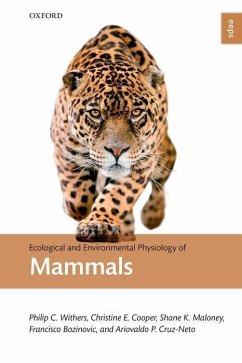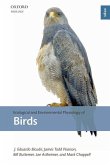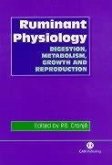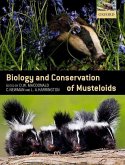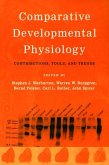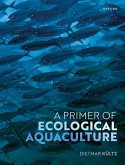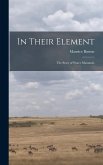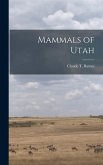Philip C Withers, Christine E Cooper, Shane K Maloney, Francisco Bozinovic, Ariovaldo P Cruz Neto
Ecological and Environmental Physiology of Mammals
Philip C Withers, Christine E Cooper, Shane K Maloney, Francisco Bozinovic, Ariovaldo P Cruz Neto
Ecological and Environmental Physiology of Mammals
- Gebundenes Buch
- Merkliste
- Auf die Merkliste
- Bewerten Bewerten
- Teilen
- Produkt teilen
- Produkterinnerung
- Produkterinnerung
This book summarizes our current knowledge of the complex and sophisticated physiological models that mammals provide for survival in a wide variety of ecological and environmental contexts: terrestrial, aerial, and aquatic.
Andere Kunden interessierten sich auch für
![Ecological and Environmental Physiology of Birds Ecological and Environmental Physiology of Birds]() J Eduardo P W BicudoEcological and Environmental Physiology of Birds189,99 €
J Eduardo P W BicudoEcological and Environmental Physiology of Birds189,99 €![Ruminant Physiology Ruminant Physiology]() Pierre CronjeRuminant Physiology373,99 €
Pierre CronjeRuminant Physiology373,99 €![Biology and Conservation of Musteloids Biology and Conservation of Musteloids]() Biology and Conservation of Musteloids189,99 €
Biology and Conservation of Musteloids189,99 €![Comparative Developmental Physiology Comparative Developmental Physiology]() Stephen J. Warburton / Warren W. Burggren / Bernd Pelster / Carl L. Reiber / John Spicer (eds.)Comparative Developmental Physiology41,99 €
Stephen J. Warburton / Warren W. Burggren / Bernd Pelster / Carl L. Reiber / John Spicer (eds.)Comparative Developmental Physiology41,99 €![A Primer of Ecological Aquaculture A Primer of Ecological Aquaculture]() Dietmar KültzA Primer of Ecological Aquaculture117,99 €
Dietmar KültzA Primer of Ecological Aquaculture117,99 €![In Their Element; the Story of Water Mammals In Their Element; the Story of Water Mammals]() Maurice BurtonIn Their Element; the Story of Water Mammals34,99 €
Maurice BurtonIn Their Element; the Story of Water Mammals34,99 €![Mammals of Utah Mammals of Utah]() Mammals of Utah34,99 €
Mammals of Utah34,99 €-
This book summarizes our current knowledge of the complex and sophisticated physiological models that mammals provide for survival in a wide variety of ecological and environmental contexts: terrestrial, aerial, and aquatic.
Hinweis: Dieser Artikel kann nur an eine deutsche Lieferadresse ausgeliefert werden.
Hinweis: Dieser Artikel kann nur an eine deutsche Lieferadresse ausgeliefert werden.
Produktdetails
- Produktdetails
- Verlag: Oxford University Press
- Seitenzahl: 608
- Erscheinungstermin: 15. November 2016
- Englisch
- Abmessung: 249mm x 175mm x 33mm
- Gewicht: 1247g
- ISBN-13: 9780199642717
- ISBN-10: 0199642710
- Artikelnr.: 47870295
- Verlag: Oxford University Press
- Seitenzahl: 608
- Erscheinungstermin: 15. November 2016
- Englisch
- Abmessung: 249mm x 175mm x 33mm
- Gewicht: 1247g
- ISBN-13: 9780199642717
- ISBN-10: 0199642710
- Artikelnr.: 47870295
Philip Withers completed his PhD in biology at the University of California at Los Angeles, in 1976, on fossorial and heterothermic mammals and birds. He then visited The University of Cape Town as a Postdoctoral Fellow, studying thermoregulation, energetics and water balance of desert vertebrates. He has subsequently held academic positions at Portland State University and currently the University of Western Australia. His major research area is comparative animal physiology, with a focus on the metabolic, thermal, respiratory, hygric and solute physiology of terrestrial vertebrates. His research melds laboratory and field studies to examine the mechanistic basis of physiological processes in an environmental context for wild, free-living animals. Christine Cooper completed her PhD in zoology at the University of Western Australia, studying numbat physiology and behaviour. She then spent a year as a Postdoctoral Fellow at the University of New England, studying thermoregulatory physiology. Since 2005 she has been a research and teaching academic at Curtin University in Perth, Western Australia. Her major research area is environmental physiology, with a focus on the metabolic, hygric and thermal physiology of mammals and birds. Dr Cooper combines laboratory and field techniques to examine the mechanistic basis of physiological processes, and applies these to wild, free-living animals. Her work addresses basic scientific questions of environmental adaptation and evolution by applying physiological techniques to examine behavioural and ecological responses to environmental conditions and life history variables. Her work also directly contributes to improved species conservation and environmental management. Shane Maloney did his PhD on emu thermal biology at the University of New South Wales. He then did a post-doc with Duncan Mitchell in South Africa, focussing on brain and scrotal temperature regulation in mammals. Since 1999 he has been at the University of Western Australia. His predominant research field is thermal physiology, including work on production animals and humans. He is interested in physiological responses to the environment in general. Francisco Bozinovic is drawn to integrative animal biology by a fascination and curiosity-based drive to understand how animals work, behave and evolve. Specifically, his research interests cover a broad range of topics in integrative animal biology, but he is mostly engaged in ecological physiology with strong ties into behavioral ecology, evolutionary ecology and biogeography. Ariovaldo P. Cruz-Neto is author of over 50 publications on the physiology and ecology of a wide group of vertebrates, particularly mammals, with an extensive experience with bats. He has research experience on metabolic physiology, especially with topics concerning the proximate and ultimate factors responsible for patterns of energy expenditure in mammals.
1: Introduction to Mammals
2: General Physiological Principles
3: Physiological Characteristics of Mammals
4: Physiological Adaptations to Extreme Environments
5: Concepts/Approaches/Techniques/Applications
6: Conclusions and Future Directions
2: General Physiological Principles
3: Physiological Characteristics of Mammals
4: Physiological Adaptations to Extreme Environments
5: Concepts/Approaches/Techniques/Applications
6: Conclusions and Future Directions
1: Introduction to Mammals
2: General Physiological Principles
3: Physiological Characteristics of Mammals
4: Physiological Adaptations to Extreme Environments
5: Concepts/Approaches/Techniques/Applications
6: Conclusions and Future Directions
2: General Physiological Principles
3: Physiological Characteristics of Mammals
4: Physiological Adaptations to Extreme Environments
5: Concepts/Approaches/Techniques/Applications
6: Conclusions and Future Directions
